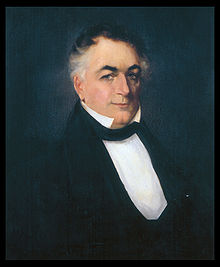
Back جيمس كلارك (سياسي أمريكي، مواليد 1779) Arabic جيمس كلارك ARZ جیمز کلارک (سیاستچی) AZB James Clark (Politiker, 1779) German James Clark (gouverneur) French ジェイムズ・クラーク (ケンタッキー州知事) Japanese Iacobus Clark (gubernator) Latin James Clark (Kentucky) Portuguese James Clark Swedish
James Clark | |
|---|---|
 portrait by Sophia DeButts Gray | |
| 13th Governor of Kentucky | |
| In office August 30, 1836 – August 27, 1839 | |
| Lieutenant | Charles A. Wickliffe |
| Preceded by | James Turner Morehead |
| Succeeded by | Charles A. Wickliffe |
| Member of the U.S. House of Representatives from Kentucky's 3rd district | |
| In office August 1, 1825 – March 3, 1831 | |
| Preceded by | Henry Clay |
| Succeeded by | Chilton Allan |
| Member of the U.S. House of Representatives from Kentucky's 1st district | |
| In office March 4, 1813 – April 8, 1816 | |
| Preceded by | Anthony New |
| Succeeded by | Thomas Fletcher |
| Member of the Kentucky House of Representatives | |
| In office 1807–1808 | |
| Personal details | |
| Born | January 16, 1779 Bedford County, Virginia |
| Died | August 27, 1839 (aged 60) Frankfort, Kentucky |
| Political party | Whig |
| Other political affiliations | Democratic Republican |
| Spouse(s) | Susan Forsythe Margaret Buckner Thornton |
| Relations | Brother of Christopher H. Clark Uncle of John Bullock Clark |
| Residence | Holly Rood |
| Profession | Lawyer |
James Clark (January 16, 1779 – August 27, 1839) was a 19th-century American politician who served in all three branches of Kentucky's government and in the U.S. House of Representatives. His political career began in the Kentucky House of Representatives in 1807. In 1810, he was appointed to the Kentucky Court of Appeals, where he served for two years before resigning to pursue a seat in the U.S. House of Representatives. He served two terms in that body, resigning in 1816.
Clark accepted an appointment to the circuit court of Bourbon and Clark counties in 1817. It was in this capacity that the most defining event of his career occurred. In 1822, he struck down a debt relief law in the case of Williams v. Blair on the basis that it impeded the obligation of contracts. His decision was unpopular with the legislature, who condemned the ruling and summoned Clark to appear before them and defend it. The following year, the Kentucky Court of Appeals upheld Clark's ruling. In retaliation, the legislature attempted to abolish the court and create a new one more sympathetic to their views. This event and its aftermath became known as the Old Court-New Court controversy.
In 1825, Clark was chosen to fill the congressional seat vacated by Henry Clay's elevation to Secretary of State. He served until 1831, but did not seek re-election that year. He became active in organizing the Whig Party in Kentucky and was rewarded for his efforts by being chosen as the party's nominee for governor in 1836. He won the election and laid out an ambitious platform to the legislature, which acted on only part of it. Clark's most significant accomplishment as governor was securing the creation of a state board of education and the establishment of public schools in every county in the state. Clark died in office in 1839. His estate, Holly Rood, was listed on the National Register of Historic Places in 1974.
© MMXXIII Rich X Search. We shall prevail. All rights reserved. Rich X Search